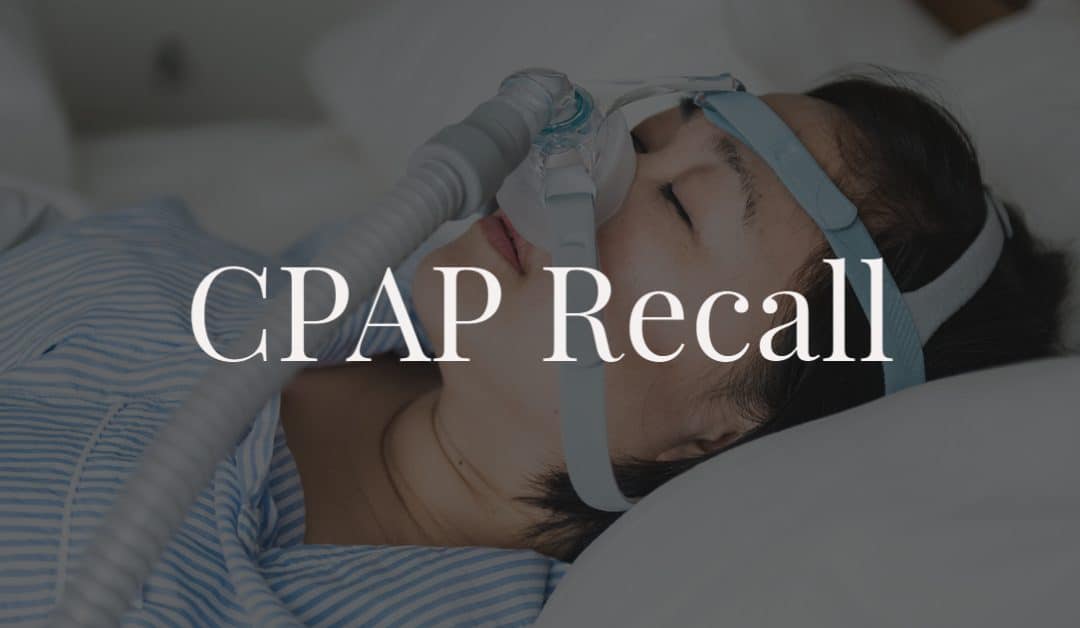CPAP Recall
Call 602-396-5801 For Next Steps
If you use a CPAP machine to breathe at night, you know how important your therapy is to your continued health and safety. It is crucial to know if you must stop using your CPAP due to a medical device recall. Phillips Respironics, a maker of respirators and CPAP machines, has recalled several CPAP breathing devices. Learn about the symptoms you may experience and which recalled devices to stop using so that you and your loved ones stay safe.
The recalled CPAP devices include all serial numbers manufactured before April 26, 2021 including:
- BiPAP V30
- Non-life Supporting A-Series BiPAP A40
- Non-life Supporting A-Series BiPAP A30
- E30 (Emergency Use Authorization)
- DreamStation ASV
- DreamStation ST, AVAPS
- SystemOne ASV4
- C Series ASV, S/T, AVAPS
- OmniLab Advanced Plus In-Lab Titration Device
- SystemOne (Q series)
- DreamStation CPAP, Auto CPAP, BiPAP
- DreamStation GO CPAP, APAP
- Dorma 400, 500 CPAP
- REMStar SE Auto CPAP
- Trilogy 100 Ventilator
- Trilogy 200 Ventilator
- Garbin Plus, Aeris, LifeVent Ventilator
- A-Series BiPAP V30 Auto Ventilator
What Is the Danger of a Recalled Device?
The recall in May by Phillips Respironics states that the sound abatement foam in continuous positive airway pressure (CPAP) machines can cause “life-threatening” and “serious injury”. The foam, called PE-PUR, presents a danger to those using the named CPAP machines. The danger is twofold and according to Phillips includes:
- PE-PUR foam may degrade into particles and enter the device’s air pathway. The particles can then be ingested or inhaled by the user
- PE-PUR foam may off-gas certain chemicals. If you use unapproved cleaning methods, such as ozone, the degradation of the foam may cause off-gassing during operation. Breathing in the gasses may cause serious life-threatening injury, permanent impairment, and require medical intervention
How Will I Know If I’ve Been Exposed to a Recalled Device?
If you see black debris or particles in the airpath of your recalled device, it is possible that your CPAP foam degraded and you are at risk. You may find the particles extending from the device outlet, humidifier, tubing, and mask.
Particulate Exposure Symptoms
Confirmed reports of medical symptoms associated with the use of the affected CPAP and BiPAP devices from Phillips include:
- headache
- upper airway irritation
- cough
- chest pressure
- sinus infection
Other types of symptoms are also possible from the particulate exposure. Your medical symptoms could include:
- Irritation (skin, eye, and respiratory tract)
- Inflammatory response
- Headache
- Asthma
- Adverse effects on other organs (e.g. kidneys and liver)
- Toxic carcinogenic affects
Off-Gassing Symptoms from Recalled Devices
Even without particulates in the air tubing, you can struggle with medical symptoms from exposure to the off-gassing of the foam in a CPAP or BiPAP machine. Phillips states that off-gassing could cause health issues such as
- headache/dizziness
- Irritation (eyes, nose, respiratory tract, skin)
- Hypersensitivity
- Nausea/vomiting
- Toxic and carcinogenic effects
What Should I Do to Get a Replacement Device?
It is recommended that you do not stop or alter your prescribed therapy until you have talked to your physician. Phillips recommends an inline bacterial filter if your physician suggests that you continue to use the device as prescribed. You can also call their hotline at 1-877-907-7508. If your device is affected by the recall, ensure you register it to qualify for a replacement device.
We Can Help
If you use an affected CPAP or BiPAP machine or are worried your respiratory device may have issues, let our sleep specialists at Enticare look at your device for safety and efficacy. We are on top of the latest developments in respiratory medicine and want to help you live your healthiest best life. There are recent developments in sleep apnea solutions that do not involve the use of a CPAP. New technology may let you sleep better without a CPAP. Contact us and set up an appointment to find out how we can help.

